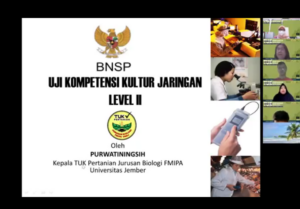 Tempat Ujian Kompetensi (TUK) Pertanian Department of Biology, FMIPA, University of Jember held Bimbingan Teknis Kultur Jaringan Level II (6/11). Purwatiningsih, S.Si., M.Si, Ph.D. Head of TUK Pertanian, Department of Biology, FMIPA, started event by introducing background for competency test. “What is importance of competency testing? Because of global competition and also multilateral agreements from C-AFTA to WTO,” said Purwatiningsih, who also said that the TUK Pertanian, Department of Biology had been verified by Lembaga Sertifikasi Profesi or LSP. Furthermore, it is said that the existence of global competition poses several challenges including the increasing need for qualified and productive workforce, the demand that Standar Kompetensi Kerja Nasional Indonesia (SKKNI) be adapted to changes and technological developments, as well as a lack of understanding to apply the Work Competency Standards as a reference for preparing educational programs. training and work competency certification. “Another challenge is the link and match between graduates of educational institutions and the industrial world, as well as foreign workers who fill strategic positions in Indonesian medium-large companies,” he said to the participants, most of whom were from Fakultas Teknobiologi Universitas Surabaya. Purwatiningsih also mentioned BNSP, an independent institution that is responsible to the president and is tasked with implementing work competencies. Uji Kompetensi Kultur Jaringan Level II begins with a request for certification, self-assessment, written test, oral test and the last is a demo test.
Tempat Ujian Kompetensi (TUK) Pertanian Department of Biology, FMIPA, University of Jember held Bimbingan Teknis Kultur Jaringan Level II (6/11). Purwatiningsih, S.Si., M.Si, Ph.D. Head of TUK Pertanian, Department of Biology, FMIPA, started event by introducing background for competency test. “What is importance of competency testing? Because of global competition and also multilateral agreements from C-AFTA to WTO,” said Purwatiningsih, who also said that the TUK Pertanian, Department of Biology had been verified by Lembaga Sertifikasi Profesi or LSP. Furthermore, it is said that the existence of global competition poses several challenges including the increasing need for qualified and productive workforce, the demand that Standar Kompetensi Kerja Nasional Indonesia (SKKNI) be adapted to changes and technological developments, as well as a lack of understanding to apply the Work Competency Standards as a reference for preparing educational programs. training and work competency certification. “Another challenge is the link and match between graduates of educational institutions and the industrial world, as well as foreign workers who fill strategic positions in Indonesian medium-large companies,” he said to the participants, most of whom were from Fakultas Teknobiologi Universitas Surabaya. Purwatiningsih also mentioned BNSP, an independent institution that is responsible to the president and is tasked with implementing work competencies. Uji Kompetensi Kultur Jaringan Level II begins with a request for certification, self-assessment, written test, oral test and the last is a demo test.
Mukhamad Su’udi, Ph.D. from TUK Pertanian, Department of Biology, FMIPA UNEJ, who delivered presentation entitled Bimtek Uji Kompetensi Kultur Jaringan Level II. Su’udi introduced jaringan tanaman kultur jaringan to terminology in kultur jaringan, for Level II it started at the stage in kultur jaringan. “At Level II, I can give an example at kultur jaringan stage, starting with planting and rearing broodstock to maintaining seedlings and also field sanitation,” he explained. Further information was also conveyed about choosing the parent plant. The selection of parent plants must meet several criteria. “The condition must be healthy, not diseased, have a clear ID. Also pay attention to the origin of the broodstock and the location of the plant,” he said.
Su’udi also explained the process of sterilization, contamination, use of media, growth regulators, to the stages of inoculation and doubling of inoculants. “It is necessary to pay attention to space sterilization, material tools, selection and extraction of explants, internal and external sterilization and the last is the inoculation itself,” he explained. It is hoped that with the material presented, participants can understand tissue culture and are ready to take the competency test. The same test was carried out by TUK Pertanian Department of Biology FMIPA UNEJ some time ago but offline with strict health protocols..




